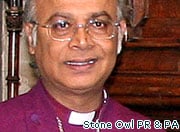Bishop Michael Nazir-Ali says he supports a Bill introduced this week in the House of Lords to tackle problems caused by Sharia courts operating in England and Wales.
The Bill aims to make it clear in law that discrimination against women within arbitration tribunals is illegal, and to stop a parallel legal system of Sharia law taking root.
The Archbishop of Canterbury Rowan Williams has not commented on the Bill, nor has the Government.
Backing
But Bishop Michael Nazir-Ali, who grew up in Pakistan and is the former Bishop of Rochester, gave it his backing.
He said: “People in this country are free to practise whatever faith they have. But at the same time we have a very long tradition of people being equal under the law.
“The problem with Sharia is that it is inherently unequal for certain kinds of people. Muslims and non-Muslims are treated unequally. Similarly, men and women are treated unequally.
Problems
“So if Sharia is recognised in any way in terms of the public law in this country, that introduces a principle of contradiction in the body of the law which will cause problems for the country and for people who will suffer, particularly women.”
The Arbitration and Mediation Services (Equality) Bill was introduced to the House of Lords earlier this week by Christian and humanitarian campaigner, Baroness Cox.
Andrew Brown, writing on the Guardian website, called the Bill “a thoroughly good thing, and a skilled piece of politics.”
Creditable
He said it was creditable that “Keith Porteous Wood of the National Secular Society appeared next to an American Christian missionary at the launch of the bill”.
The Bill proposes to firmly outlaw discrimination against women within arbitration, so it would be illegal for a Muslim Arbitration Tribunal to treat a woman’s testimony as worth half that of a man’s.
It also seeks to create a new offence of falsely claiming legal jurisdiction over criminal or family law.
Duty
And it proposes to place a legal duty on public bodies to inform women that they have fewer legal rights if their marriage is not recognised under English law.
But the Bill does not interfere in the internal theological affairs of religious groups.

